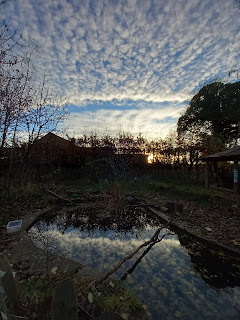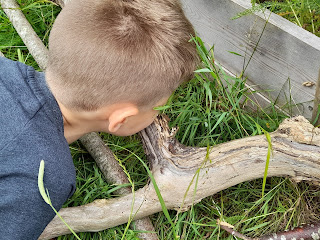Not the kind with diamond rings - the kind that often feels like bells and whistles may be needed for the children's engagement in whatever you're doing! In Forest School, we know that not all children will be engaged in every activity, which is why we have so many available, but it can be difficult to hook in THAT child who seems to not want to join in with anything.
Now before we start please know I don't have any magic formula. The small number of children who are disengaged from almost EVERYTHING that we do have an assortment of reasons for being so.
The majority of our activities are staples, available every week. Things like:
- Bug Hunting
- Tree/plant/flower/fungi/lichen ID
- Bird info and binoculars
- Basic woodwork tools (peelers, palm drills, string)
- Digging tools
- Mud Kitchen
- litter pickers
- Nature table
- Books
- Dens
The 'Nature Table' alters with the season and is something they create with their own treasures. Tree climbing is a given unless we've had really high winds then it's restricted so I can watch them in case of broken branches. Also, driving rain doesn't make climbing with wellies particularly easy, so it has to be a judgement call on the ability of the class who's outside. This is usually determined by their level of concentration rather than their physical abilities, and I'd rather restrict an entire class than pick out individuals I know won't climb safely.
Books are usually available, but in really wet, muddy weather I do put them away. I hate doing it, but the risk of papier-mache pages and mud-splattered covers is one I can't take. No one's budget covers replacing 10 years worth of books!
Smaller activities like the geo-board, rocks and crosses, and a knot tying guide (with laces) are out every session too.
But we also try to have something different each session also. Activity focuses vary; extending tool use, larger dens, fire lighting, cooking, art/crafts, planting etc. With full classes, it's difficult to take just a few to one side, although this will hopefully be easier in September when 2hr sessions are resumed and there's time for all to have a turn! We do do them now, but some children still resist joining in!
Then there are those classes who see Forest School as an extra 'playtime'. They transfer the chase games and the reenacting of computer games from the playground into the woods! Some of them are stuck in this cycle. Every week they boycott what Forest School has to offer in preference of perpetual 'man hunt'.
This can be frustrating. Especially when in retrospect they regret missing out - but still choose to ignore Forest School activities. Again some of this may resolve with longer sessions resuming in September.
Meanwhile, I KNOW that children involved in these kinds of games are learning skills; creating rules, imagining scenarios, communicating, working as a team, following some kind of narrative, using their fine and gross motor skills, and refining the game each time they play it. They may also need this kind of activity, one they know well, one that doesn't involve much change or demand on them. One that cements their friendships. One that allows them to release lots of energy and emotions.
However, I repeat: This is frustrating!
One of the best things about weekly sessions for the entire school year is that eventually lots of children do drift away from this behaviour. They either tire of it or move on having got out of it what they needed. They venture into the digging area, they come and do some woodwork, they want to explore the nature table, look at a book, or help me with a task. This week most year groups helped crush and mix charcoal paint to create a chalkboard for me, I hardly had to help at all! This did involve children ceasing their participation in chase games.
Today a Year 1 child saw some cut grass drying out and chose to weave a birds nest. She only found me once she needed help finding a place to put it. She thought of this activity and completed her self chosen task independently.
Some children from any year group are reluctant due to confidence, but that builds over time. These young children frequently need an adult close by for reassurance and after a few attempts at something they'll try it alone.
Following the children's interests can be tricky, after all, if you have 25 in a class that's potentially 25 different directions to follow!
Sometimes it is possible: today four Year 6 girls were looking closely at a bee on the elderflower and asked what a 'baby bee' looked like. I have a model life cycle so a went and got it (oh the joy of having a 'shed' on site!). It was in a bag with other life cycle pieces, which they saw, and suddenly we were sorting plastic ladybird eggs from ant eggs, stag beetle larvae from caterpillar chrysalis, and challenging each other to work out the order of them all.
For 20 minutes they observed and related it to prior knowledge and what was around them. They called friends to join in and answered questions from classmates who paused to see what they were doing. It was great to see them so engaged.
The children who use Forest School to run themselves ragged, to chase, to hide and seek, to act out epic games with classmates, who ignore so many activities, who seem to miss out on so much, usually need to be expell all that energy. I can think of several children who struggle to be still in the classroom (and stillness is the most difficult of movements to learn!), and have difficulty focusing.
On first arrival why should these children be different in Forest School? Some settle after half an hour, some settle more after a few sessions. Some need this outlet every week.
It can feel like they are not moving on, that it's 'that game' again.
Listening in and observing will often show that the 'game' does evolve, that the longevity of it allows for its development, for rules to be established and improvements made.
The squabbles in September when they started this self-chosen activity took up a lot of adult time. As the weeks and months pass this lessens, they get better at sorting out issues themselves, although it means when they do seek adult intervention the problems often seem bigger. It may seem their behaviour is 'getting worse' because you are no longer dealing with the minor conflicts the game throws up.
Encouraging the children to move away from this activity leads to some success. A few children choosing to do something else for a while, and one or two declaring the game 'boring' this week. They need to see alternatives available, but dragging them away from their game to do something an adult chooses may bring participation, but not engagement.
There are usually one or two children who seem reluctant to participate in ANYTHING.
Some have issues in forming relationships with their peers and have created a situation where they don't know how to join in. Some of these children actively try to get others to disengage and join them in sitting out (which rarely works!), some arrive determined not to enjoy themselves.
There are reasons behind that persona. All children who find joining in with Forest School challenging have a reason for their reticence. For some it might depend on what others are doing, or even who is present, to determine if they will step out their comfort zone and become part of that group. Not all children will just wander off and do their own thing. Maybe they aren't confident enough for that independence, or to ask to join in. Adult support should always be offered, but many children need time...
Maybe they don't like big groups.
Maybe they only feel at ease with a chosen few.
Maybe things that have nothing to do with school or Forest School are lingering or dominating how they feel today.
Maybe sitting quietly alone is what they need right now.
Maybe the opportunity to take that space, to engage in solitude, to think, to feel, to just be, is the best thing for them.
Maybe they're just having a bad day!
This doesn't mean they can't be offered activities, or encouraged to get involved, but recognising that sometimes that physical space = head space is important. We all know nature is great for mental health, not all mindfulness is adult led.
With 14 classes of up to 30 children each week (350+ individual children at Forest School) there is a huge range of personalities, needs, and attitudes. But only 1% who SOMETIMES don't want to be there. These children are not like this every single week, and often not for the whole session.
In my experience, the children who need to spend time running are the ones who do the most sitting in class. Upper KS2 certainly have the most energy to expell, yet this happens much less when Forest School is a staple from the EYFS onwards. The children grow up seeing Forest School as specific Forest School time, they want to use the time to explore and investigate, and grab the opportunity to try things that are new, rather than use the time doing activities they can do elsewhere.
I hope that as time goes on the children at Chartham take the opportunities Forest School offers, and I hope I always give space to those who don't want to join in every time.
Engagement isn't always participation.
Participation doesn't mean engagement.
I will always aim for engagement.













Comments
Post a Comment